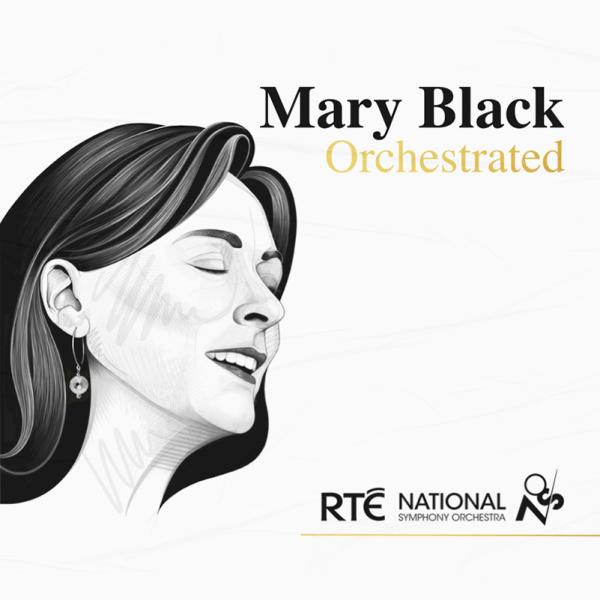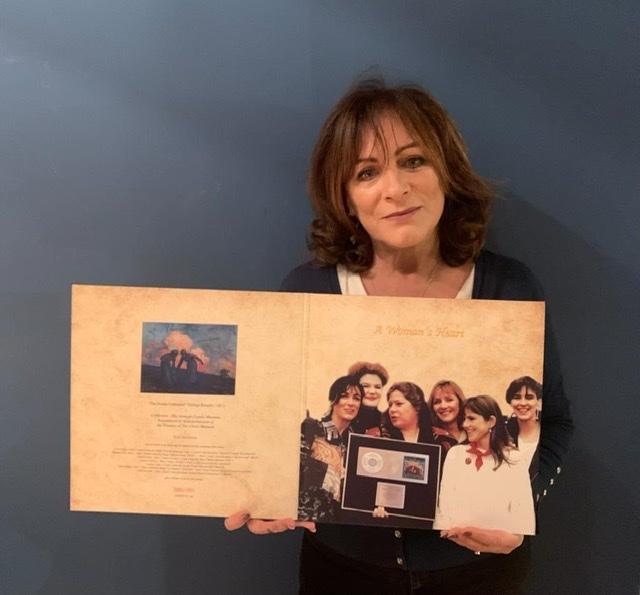Angel Voices
John Brophy finds a suitably spiritual location to ask Mary Black about her new album, Speaking with the Angel.
The hottest day of the year and I'm looking across the street at Christ Church Cathedral, first built at the start of the Millenium (Sigurd, King of Dublin, 1038). For once, the tourists in the open-top buses are not being drowned by thundershowers, and they're busy taking pictures of all the gargoyles and angels around the Norman pile. Sitting next to me is Mary Black who is finishing off the same Millenium on a similarly angelic not, with her album Speaking with the Angel. This is her ninth solo album, and the first one she has worked on with Donal Lunny. "It's something I've always wanted to do", she says, but until now the opportunity never arose. Donal isn't the only known name on the credits. There's the bass player James Blennerhassett, full of stories and good humour, and the name Steve Cooney also features strongly. There's one unfamiliar name though, a bass player called, wait for it, Jabirrunnga Nunnagye, who features on the song Broken Wings. Ah, Mary explains, that's the spirit of an Australian Aboriginal musician who took possession of Steve Cooney during that track, Steve is adamant this happened, and Steve says due credit should be given. I am deeply impressed: it's only long afterwards I wonder how you organise a work permit for a happening like that. The same track also features Liam ó Floinn on pipes, another first-time collaboration, and there's also some cool mean-toned harmonica playing from Brendan Power.
In another track, Fall at your Feet, Frank Gallagher uses violas, which are double tracked. More and more people are appreciating the richness of tone and depth the viola can give, and her own song is an example of that. How did this album start? Well, there's a holiday place beyond Dingle at Cuas, which is where St. Brendan departed and found America. (Only he had sense enough to keep quiet about, say the begrudgers. We were never short of the bitter word.) That part of the world is Steve Cooney's adopted homeland, and when they got a chance to meet and arrange to do an album he brought something special out in her singing.
In general, this is a slower-paced collection than others. I'm emboldened to ask if a lot of the songs aren't about loss, suffering, and resignation? Mary doesn't deny it, but these are the emotions that seem to drive people to write songs. And when you think of it, it's so true, from all the songs of rejected love and emigration right through to material just being penned today.
Steve also has a song of his own on the collection. Bless the Road is a lovely song about farewell and heartbreak, but done with dignity and no rancour. The title track is a song by Ron Sexsmith. It was sound engineer Billy Robinson who introduced her to the material, and she went for it at once. Does it deal with Learning Difficulties (what used to be called mental handicap)? I get the same vibe there as from Phil Coulter's Scorn Not His Simplicity. Actually Ron is playing in town on the very night we're talking, and Mary is busy trying to rearrange a schedule to get to see him - as far as she knows, he isn't aware that she has recorded the song yet. But songs stand apart, and you take from them what you find. In this case, Mary has found a lot, and she is taking to the roads and airways to show it.
There's a short US tour, which will be broken for a homecoming for the album launch; then there's Belgium for a fortnight, and then an Irish tour in September, followed by three weeks in the US. After that, it's Britain and in December she goes to Japan. Somewhere in between all this, there is a Hen Week with friends, unnamed, planned for a quiet spot in Spain, a little inland from the coast: prepare for action, ye paparazzi!
How to survive while on tour is an art in itself. Like many singers she finds the dryer climate and the ventilation systems on aeroplanes can be hard on the voice; the best way is to travel by bus while you're sleeping - as long as there is a hotel room and full facilities waiting at the other end. A bus minus hotel can be stressful, needing the temperament of an angel, but you get to know when someone needs a little space, and you make sure you don't intrude.
All the touring might seem like a lot of time away from home, but Mary likes to have a break between tours, and touch base. With three offspring of her own, plus an add-on from Canada who looks like becoming a semi-permanent feature, keeping in contact is important. Talking of Canada, she says she makes a point of including places like Toronto on tour schedules, but she has never been to Cape Breton or Nova Scotia, and would love to go. When it happens, it will be mighty.
But increasingly she is finding Ireland a wonderful country to come home to; there's such a wealth of scenery and people. She recently tore herself away from the mountains of Kerry for a week on the wide sweeps of water on the Shannon, beautiful in a very different way. They ended up having a great session in Lanesboro with local singer Davy Brennan. What about the island home on Rathlin, where you can see across the sea of Mayle to the Mull of Kintyre? It's still in the family, and she still visits there, even once going by helicopter. But it's about 300 miles between Rathlin and Kerry, and that's where the home of the heart is at the moment.
A couple of weeks earlier she had climbed Mount Brandon, second highest mountain in the Kingdom. "There were even people aged over 60 using hands and knees to get to the top. It was one of the most physically demanding things I've done, but it was also spiritually very rewarding." Any pictures of the event? The day she climbed it, the summit was covered with icy mist and rain: by the time she got down, she was covered in mud to the waist no, no pictures!
The other way she is seeking to become a Kerrywoman is through set dancing. "You could go on for hours, and never feel the bad back. It's like basketball when I was younger." And seeing there was a recent picture of herself and sister Frances with the most noted of Kerrymen, Micheál ó Muircheartaigh, at the Éist album launch, could we ask is she planning any more songs in Irish. She has recorded both Bruach na Carraige Báine and Giolla Mear, and maybe the Kerry influence will work to inspire more.
There was of course, Irish on Rathlin, but Government policies and economics conspired to end it in her grandfather's time, though he could remember the earlier generation speaking it.
The present album is recorded on three labels: Dara, their own label, is for Ireland; Grapevine is for Britain and Europe, and in the US and Canada it's Curb. Dara's own office is in Ship Street (orginally Sheep Street) close by, near Hoey's Court where Jonathan Swift was born, and beside Dublin Castle where can been seen politicians parading from inquiries into sins of the past. It's truly historical, and it's close to Mary's Dublin base in Harold's Cross, where earlier in the Millennium, the Archbishop of Dublin maintained a private gallows. That's gone a while now.
What about what's called the Nashville influence? "Well," says Mary, "I have never claimed to be a traditional singer. I have such a broad interest that I take in whatever influences I need for a particular song. One track could have a very traditional feel and the next could be quite bouncy rock: it's whatever work for the material." And where does the material come from? She has favourite writers like Sandy Denny who wrote the song Moments only weeks before she died in a accident in 1980; that song has lived with her for a good while, until the time was right to record it. Another song is by Dougie McClean, well known in Scotland, who wrote the great Caledonia, which Frances recorded.
There are 11 tracks in all, plus Fields of Gold as a bonus: the old showbiz adage of always leave them wanting more applies here. There were about 15 songs recorded, but some have to wait for another chance. She speaks of other musicians, especially piano player Pat Crowley: if there is any regret, it's that most of the piano work was on tracks that didn't make it this time.
As a producer, she says, she has become less obsessive with total perfection; a little imperfection ensures something unique, it's the mark of hand-crafted individuality: that's why on Broken Wings, she recorded it all on one take, and decided not to retouch it, though she once would have done. Maybe that's mellowing or maturing. And how about the younger generation? The Black clan, like Lunnys, has no shortage of young talent: there are guitars and other things being played all the time, for the love and enjoyment of it. If anyone wants to make a career of it, they will get support, but nobody's under any delusions that it's an easy life. Still, the music has been handed on, and it's safe for the start of the new millennium. And that's a big part of what the tradition is about.


